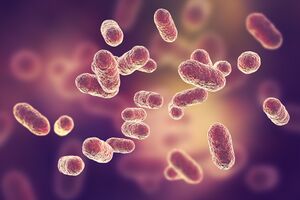Gut Microbiota and Autism: Difference between revisions
| Line 2: | Line 2: | ||
==Introduction== | ==Introduction== | ||
<br>By Bailey Fitzgerald <br> | <br>By Bailey Fitzgerald <br> | ||
<br> | <br><b>3000 words</b><br> | ||
<b>3000 words</b> | |||
<br> | |||
The human gut microbiome plays a larger role in human health than simply digestion. Gut microbiota have the ability to bidirectionally communicate with the central nervous system and influence both emotional and cognitive centers of the brain.<ref name=Carabotti>Carabotti M, Scirocco A, Maselli MA, Severi C. The gut-brain axis: interactions between enteric microbiota, central and enteric nervous systems. Ann Gastroenterol. 2015;28(2):203–9.</ref> This makes maintenance of the gut microbiome especially important in people with a variety of neurological conditions, including autism spectrum disorder (ASD). Autism spectrum disorder is a neurological and developmental disorder characterized by deficits in social communication and social interaction, repetitive patterns of behavior or activities, and restricted interests.<ref name=DSM>American Psychiatric Association, American Psychiatric Association. Diagnostic and statistical manual of mental disorders: DSM-5. 5th ed. Washington, D.C: American Psychiatric Association; 2013.</ref> In addition, gastrointestinal (GI) issues are a very common comorbidity in ASD patients.<ref name=Li>Li Q, Han Y, Dy ABC, Hagerman RJ. The Gut Microbiota and Autism Spectrum Disorders. Front Cell Neurosci [Internet]. 2017 [cited 2021 Mar 17];11. Available from: https://www.frontiersin.org/articles/10.3389/fncel.2017.00120/full?fbclid=IwAR04gQH8jD4LVLXEJnl7MfXsCyDR7USEauiGGIc1BXJY48GTn2L5GQg-Hk0</ref> Although the cause of the abnormal gut microbiome is not certain, researchers hypothesize that it could be due to atypical eating habits.<ref name=Mulle>Mulle JG, Sharp WG, Cubells JF. The Gut Microbiome: A New Frontier in Autism Research. Curr Psychiatry Rep. 2013 Feb 1;15(2):1–9.</ref> Thus, therapies targeting the gut microbiome could have potential in treating and managing autism spectrum disorders. | The human gut microbiome plays a larger role in human health than simply digestion. Gut microbiota have the ability to bidirectionally communicate with the central nervous system and influence both emotional and cognitive centers of the brain.<ref name=Carabotti>Carabotti M, Scirocco A, Maselli MA, Severi C. The gut-brain axis: interactions between enteric microbiota, central and enteric nervous systems. Ann Gastroenterol. 2015;28(2):203–9.</ref> This makes maintenance of the gut microbiome especially important in people with a variety of neurological conditions, including autism spectrum disorder (ASD). Autism spectrum disorder is a neurological and developmental disorder characterized by deficits in social communication and social interaction, repetitive patterns of behavior or activities, and restricted interests.<ref name=DSM>American Psychiatric Association, American Psychiatric Association. Diagnostic and statistical manual of mental disorders: DSM-5. 5th ed. Washington, D.C: American Psychiatric Association; 2013.</ref> In addition, gastrointestinal (GI) issues are a very common comorbidity in ASD patients.<ref name=Li>Li Q, Han Y, Dy ABC, Hagerman RJ. The Gut Microbiota and Autism Spectrum Disorders. Front Cell Neurosci [Internet]. 2017 [cited 2021 Mar 17];11. Available from: https://www.frontiersin.org/articles/10.3389/fncel.2017.00120/full?fbclid=IwAR04gQH8jD4LVLXEJnl7MfXsCyDR7USEauiGGIc1BXJY48GTn2L5GQg-Hk0</ref> Although the cause of the abnormal gut microbiome is not certain, researchers hypothesize that it could be due to atypical eating habits.<ref name=Mulle>Mulle JG, Sharp WG, Cubells JF. The Gut Microbiome: A New Frontier in Autism Research. Curr Psychiatry Rep. 2013 Feb 1;15(2):1–9.</ref> Thus, therapies targeting the gut microbiome could have potential in treating and managing autism spectrum disorders. | ||
Revision as of 03:58, 6 April 2021
Introduction
By Bailey Fitzgerald
3000 words
The human gut microbiome plays a larger role in human health than simply digestion. Gut microbiota have the ability to bidirectionally communicate with the central nervous system and influence both emotional and cognitive centers of the brain.[1] This makes maintenance of the gut microbiome especially important in people with a variety of neurological conditions, including autism spectrum disorder (ASD). Autism spectrum disorder is a neurological and developmental disorder characterized by deficits in social communication and social interaction, repetitive patterns of behavior or activities, and restricted interests.[2] In addition, gastrointestinal (GI) issues are a very common comorbidity in ASD patients.[3] Although the cause of the abnormal gut microbiome is not certain, researchers hypothesize that it could be due to atypical eating habits.[4] Thus, therapies targeting the gut microbiome could have potential in treating and managing autism spectrum disorders.
Section 1

Include some current research, with at least one figure showing data.
Every point of information REQUIRES CITATION using the citation tool shown above.
Section 2
Include some current research, with at least one figure showing data.
Section 3
Include some current research, with at least one figure showing data.
Section 4
Conclusion
References
- ↑ Carabotti M, Scirocco A, Maselli MA, Severi C. The gut-brain axis: interactions between enteric microbiota, central and enteric nervous systems. Ann Gastroenterol. 2015;28(2):203–9.
- ↑ American Psychiatric Association, American Psychiatric Association. Diagnostic and statistical manual of mental disorders: DSM-5. 5th ed. Washington, D.C: American Psychiatric Association; 2013.
- ↑ Li Q, Han Y, Dy ABC, Hagerman RJ. The Gut Microbiota and Autism Spectrum Disorders. Front Cell Neurosci [Internet]. 2017 [cited 2021 Mar 17];11. Available from: https://www.frontiersin.org/articles/10.3389/fncel.2017.00120/full?fbclid=IwAR04gQH8jD4LVLXEJnl7MfXsCyDR7USEauiGGIc1BXJY48GTn2L5GQg-Hk0
- ↑ Mulle JG, Sharp WG, Cubells JF. The Gut Microbiome: A New Frontier in Autism Research. Curr Psychiatry Rep. 2013 Feb 1;15(2):1–9.
Authored for BIOL 238 Microbiology, taught by Joan Slonczewski, 2021, Kenyon College.
